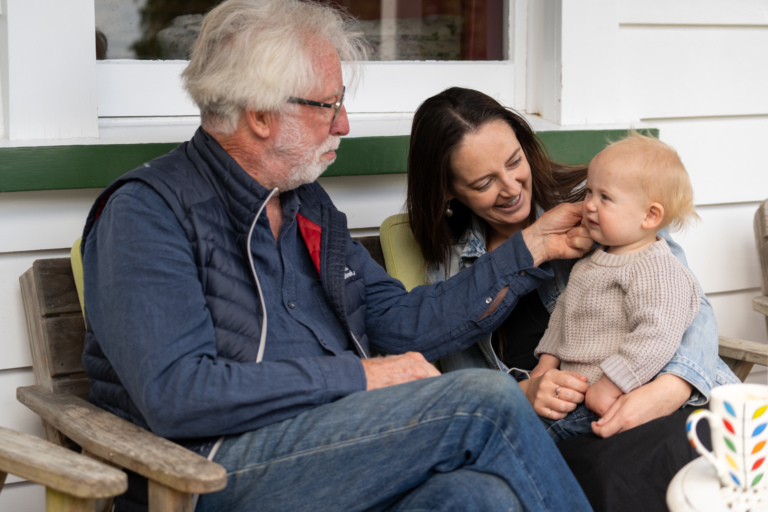October 11, 2023
Having the ‘End of Life’ Chat with Your Parents

Vaughan and his mum have had several death talks. Hayley and Fletch decided they needed to do the same. It was a casual conversation that lasted less than a minute on air yet it showed that talking about death and dying with our parents doesn’t have to be a negative experience.
The Go With Grace team spoke about the show on and off all day and questions were fired around the office. Most importantly, we wanted to know how can Go With Grace encourage more New Zealanders to have this conversation with their parents?
Why we need to talk about death
Death is a subject that many of us in NZ put off. It’s uncomfortable. It can hurt. We don’t want to offend anyone. Many of us have trauma around the death of a loved one, and others simply just don’t want to think about it.
When we put off talking about death and dying, we do not make it any easier for ourselves when the time finally comes when we are faced with death and have no idea what to do next.
Hearing death being spoken about in such an open and honest way on air on one of New Zealand’s most popular radio stations was refreshing. After all, Go With Grace was established partly to facilitate open conversations about death and dying.
When we can talk about death and dying more openly, we can find support more easily. We can ensure expectations or wants are clearly defined by our loved ones before they are unable to do so, and we can help avoid potential confusion or doubt down the track.
When we put off talking about death and dying, we do not make it any easier for ourselves when the time finally comes when we are faced with death and have no idea what to do next.
What is a Death Chat?
Our parents are older than us. This seems so obvious – yet many of us forget how old our parents are.
Now it is time for us to give back to them. And for us to support them, we need to know what they want.
A death chat could look very different depending on your family. What you will want to talk about and how you can approach the conversation will depend on a huge number of factors, including the health of your parents.
For those facing a terminal illness diagnosis, encouraging them to talk about the prospect of dying is important. Hospice New Zealand has a great online resource encouraging people to talk openly about dying.
Healthify He Puna Waiora also encourage those with terminal illnesses to communicate openly to help you not feel isolated or alone, and to let others know how they can support you.
An important thing to talk about is what you all can do together to ensure their wishes can be followed in their absence.
Some Topics to Cover Include:
- Do they have a will? If the answer is no, you can discuss why it is important to have a will.
- Have they thought about an Enduring Power of Attorney (EPA)?
- Have they thought about all the things that aren’t covered in a will? For example, when someone passes away, their bank accounts are frozen. It could take a while before their partner can access this account, so checking that couples have joint accounts could form part of your conversation.
- Where do they want to live as they age? Some people will want support to stay in their own homes. Others might want to move to a retirement village. It is worth clarifying expectations around this including costs of home support or retirement homes in advance. You might be surprised at what your parents want!
- Do they have specific funeral preferences? Some people prefer less traditional funerals but if this isn’t communicated beforehand they probably won’t get the send-off they would have wanted.
- It may be helpful to talk about their feelings such as fear or anxiety around dying. You can ask if they’d like to discuss this, but respect their decision if they are not ready to.
When Should a Death Talk Happen?
This doesn’t have to be, nor should it be, a one-off conversation.
People’s preferences, their needs, their beliefs, and their priorities change over time. What your parents might have wanted ten years ago may not look the same today.
There is nothing wrong with communicating clearly with your parents often and checking their expectations after significant life changes. For example, if they become unwell, they might decide living at their own home for as long as possible is not a priority anymore, and they would prefer to receive more support within a care facility.
Overcoming our reluctance to talk about aging and death can be healthy and positive. It will help you to feel connected, help your parents to feel understood, and it will help to ensure your loved one’s wishes are met.
Our Death Plan tool allows people to ensure key information is available once they are gone. This can be created for free and securely shared with nominated friends and family members.
If you’re looking for help starting your death talk, take a look at the Death Deck. These conversation starter cards give questions to spark discussions in a lighthearted way.
We Need to Talk About Death
For those facing a terminal illness diagnosis, encouraging them to talk about the prospect of dying is important. Hospice New Zealand has a great online resource encouraging people to talk openly about dying.
Healthify He Puna Waiora also encourage those with terminal illnesses to communicate openly to help you not feel isolated or alone, and to let others know how they can support you.


